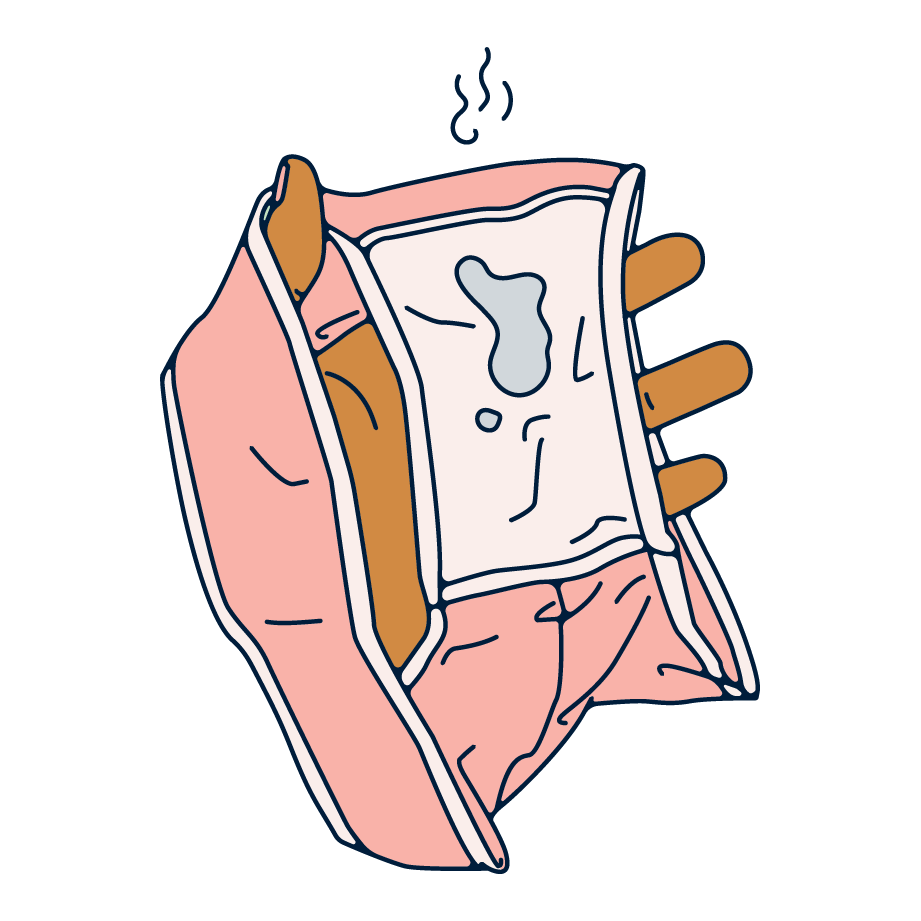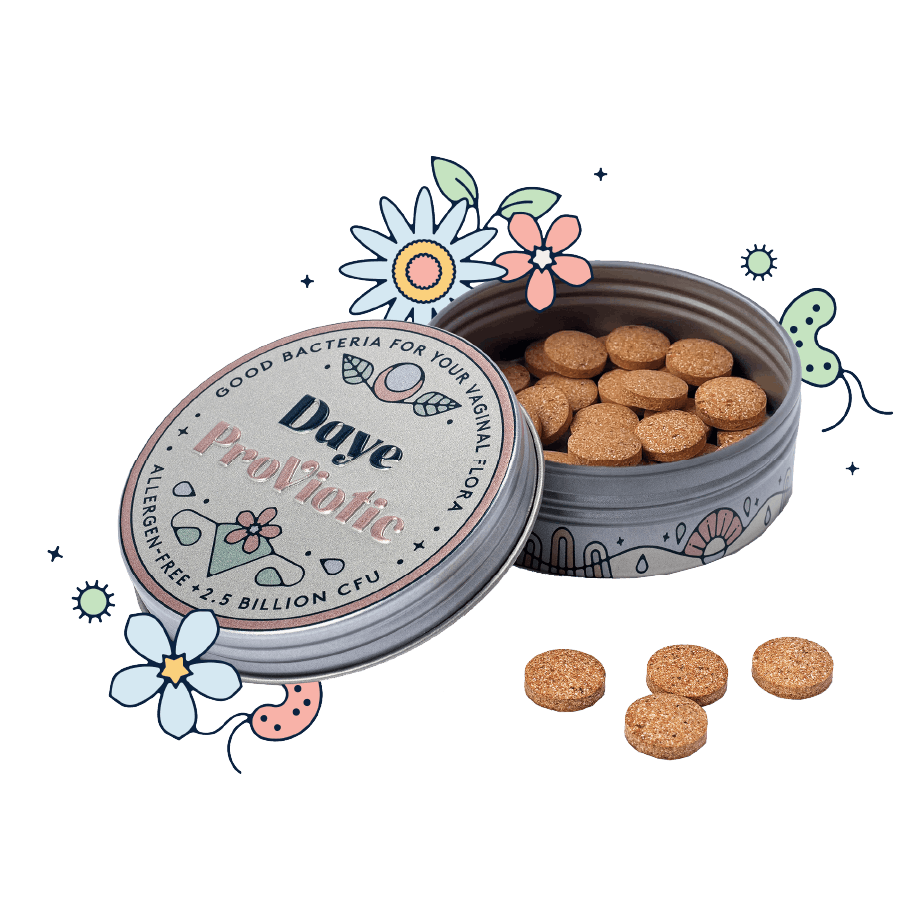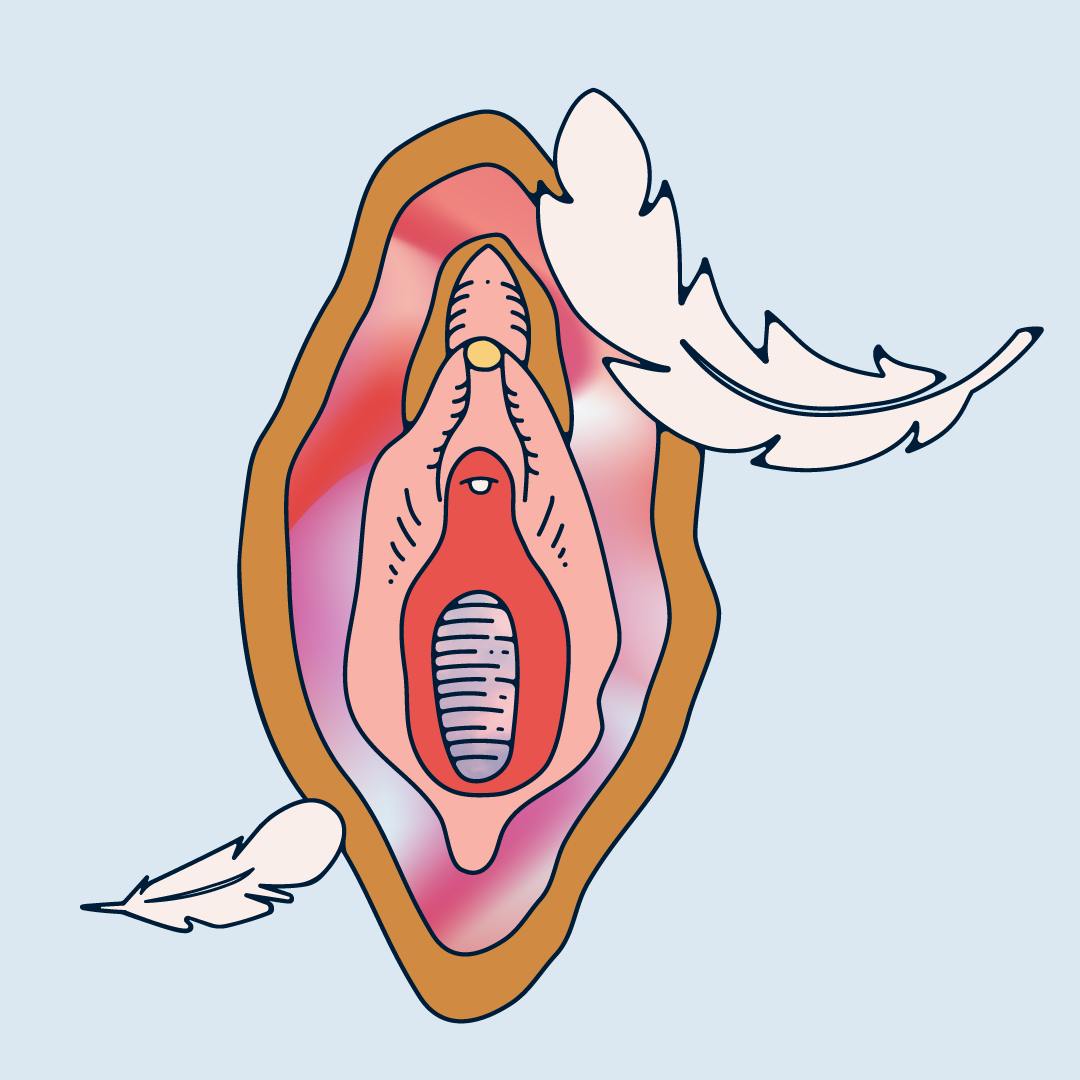Table of contents
1. What exactly is menopause (and perimenopause)?
2. What is vulvovaginal atrophy?
3. What are the symptoms of vulvovaginal atrophy?
4. How does vulvovaginal atrophy impact the vaginal microbiome?
5. When should I see a doctor about vulvovaginal atrophy?
6. Can probiotics help with vulvovaginal atrophy?
7. How else can I treat vulvovaginal atrophy?
Illustrated by Erin Rommel, Sabrina Bezerra & Ralitza Nikolova.
It’s estimated that 13 million people are going through either the menopause or the peri-menopause in the UK right now.
If, like me, you struggle with numbers, that figure can be too vast to comprehend – and yet, it’s the reality. 13 million people are continuing with their daily tasks, ploughing on with their daily routine, going about their daily life – all while experiencing many of the debilitating symptoms that come with the condition.
Not everyone struggles, of course. The menopause will affect everyone differently, and some may not notice many symptoms at all, if any. But symptoms of menopause affect over 75% of people who experience it; and more than 25% describe their symptoms as severe. That’s a hell of a lot of people trying to go through life while seriously struggling with the menopause; not to mention those experiencing early menopause, which can come with a host of its unique struggles.
For many, menopause is debilitating. Symptoms range from physical to mental (more on this below); and one symptom in particular doesn’t get much airtime, despite the fact that it can be uncomfortable, painful and distressing. We’re talking about vulvovaginal atrophy – but first things first.
What exactly is menopause (and perimenopause)?
Dr. Claire Bailey is a consultant Gynaecologist and founder of The Vulval Clinic. “The menopause is defined as periods having ceased for 12 months,” she says. “The average age for menopause in the UK is 51 but a menopause at 45 or over is considered normal.”
The perimenopause, Dr. Claire explains, is the time during which someone is approaching menopause. “This is very variable in time scale and often lasts years,” she explains. “It is characterised by the onset of menopausal symptoms, most noticeably hot flushes and night sweats, but periods continue”; though she adds that the perimenopause can be associated with a change in bleeding pattern.

Symptoms of menopause can include the aforementioned hot flushes and night sweats, as well as:
And then, of course, there are the vaginal symptoms of menopause: namely, vulvovaginal atrophy.
What is vulvovaginal atrophy?
Essentially, atrophy of the vagina is what’s known as a genitourinary syndrome of menopause (GSM); a condition that can be debilitating and which can affect over 50% of postmenopausal people. And it all comes down to oestrogen (or, rather, the lack of).
“Vulvovaginal atrophy refers to a lack of oestrogen in the skin of the vagina and vulva,” Dr. Claire explains. “Before menopause, oestrogen, made by the ovaries, fills cells making them robust. When looked at through a microscope, the cells look like balloons.
“After the menopause, the ovaries no longer produce oestrogen and subsequently cells are depleted of oestrogen,” she continues. “They become fragile and easily damaged (rather like a crinkled autumn leaf when looked at with a microscope).”

What are the symptoms of vulvovaginal atrophy?
“The result [of vulvovaginal atrophy] is that the vagina and vulva can feel dry, sore and itchy,” Dr. Claire continues (as a side note, itching can also be known as pruritus). She goes on to explain that these symptoms can be “particularly bothersome” with sex, as intercourse can lead to:
- “A burning pain in the vagina”;
- “Bleeding with penetration”;
- “Reduced vaginal lubrication.”
Other symptoms of VVA (also known as atrophic vaginitis) are a thinning of the vulva and loss of elasticity in the vagina.
“
A reduction in lactobacilli has been associated with vaginal inflammation and dryness.
How does vulvovaginal atrophy impact the vaginal microbiome?
“The vagina has a unique microbiome (a group of microorganisms that live inside the body), with lactobacillus species being the dominant species in most women,��” says Dr. Claire. “The lactobacilli are responsible for producing lactic acid, which keeps the vagina strongly acidic.” It’s worth noting, too, that lactobacilli subsequently maintain a healthy vaginal pH.
“With the reduction of oestrogen at menopause, an imbalance of vaginal organisms can follow, Dr. Claire summarises, adding: “A reduction in lactobacilli has been associated with vaginal inflammation and dryness.”
Fewer lactobacilli can also result in an increased risk of vaginal infections, such as:
- Bacterial vaginosis (BV);
- Yeast infections;
- Sexually transmitted infections;
- Urinary tract infections.

When should I see a doctor about vulvovaginal atrophy?
“Any bleeding after the menopause or bleeding with sex should always be assessed by a doctor urgently,” Dr. Claire emphasises. “Women shouldn’t have to suffer from vulvovaginal discomfort and so should seek help to treat any of the symptoms of atrophy.”
It’s normal to feel shy or nervous about approaching a healthcare professional with questions about vaginal discomfort – but not least because of the gender health gap, which, too often, sees women’s concerns getting brushed off or dismissed – but it’s crucial to book an appointment if you notice anything unusual or out of the ordinary.
Vulvovaginal atrophy has a prevalence that ranges from 36% to nearly 90% of peri- and postmenopausal women; and yet it’s still too often underdiagnosed and, consequently, undertreated. Like Dr. Claire said, no one should have to struggle on with vulvovaginal issues; so it’s vital to seek medical advice for a diagnosis and potential vulvovaginal atrophy treatments. On which note…
Can probiotics help with vulvovaginal atrophy?
“There is increasing evidence to support the use of probiotics (either oral or topical), that specifically reinstate a healthy vaginal microbiome, where lactobacilli dominate,” says Dr. Claire.
She’s right; one study found that, “oral or vaginal use of probiotics in postmenopausal women is [...] very effective in reducing menopausal symptoms caused by GSM”.
Evidence regarding the relationship between probiotics and vaginal health (and, subsequently, vaginal symptoms of menopause) is still limited. But if you’re looking for a place to start when establishing what could work for you, Daye’s ProViotics contain purely live lactobacilli – which, as we already know, is the good stuff. This means they could potentially protect against the vaginal infections that become more common when the vaginal microbiome is disrupted (such as BV).

How else can I treat vulvovaginal atrophy?
If probiotics aren’t for you, there are other means of treating vulvovaginal atrophy that can make a real difference to symptoms. “Vulvovaginal atrophy can be very effectively treated in most cases,” says Dr. Claire.
“Your doctor can prescribe replacement oestrogen as a cream or pessary. This oestrogen can be inserted into the vagina with an applicator or rubbed onto the vulval skin. The treatment not only replenishes cells with oestrogen but also directly influences the dominance of lactobacilli within the microbiome,” Dr. Claire elaborates.
“Topical oestrogen is a very safe treatment and can be used in women that cannot tolerate oral oestrogen; it is not the same as HRT (Hormone Replacement Therapy),” says Dr. Claire. (HRT is described by the NHS as replacing “hormones that are at a lower level as you reach the menopause”, and as potentially unsuitable for those with a history of breast cancer, ovarian cancer or womb cancer, blood clots or untreated high blood pressure, among other conditions.)
It’s also worth noting that you can combine oestrogen and probiotics. The aforementioned study observed: “Compared with estrogen alone, estrogen combined with probiotics significantly improved GSM symptoms, mainly vaginal dryness and dyspareunia [painful sex], and increased vaginal health scores��”.
But vaginal moisturisers are available, too, if oestrogen isn’t right for you. “For [...] women that topical oestrogen is unsuitable for, Replens is a water based vaginal moisturiser that is a non-hormonal alternative,” says Dr. Claire.
Ultimately, everyone’s body is different and it’s important to find the diagnosis and treatment that works for you. Vulvovaginal atrophy is no different from any other painful or uncomfortable condition. It can be debilitating, and you deserve to have it correctly diagnosed and effectively treated.






